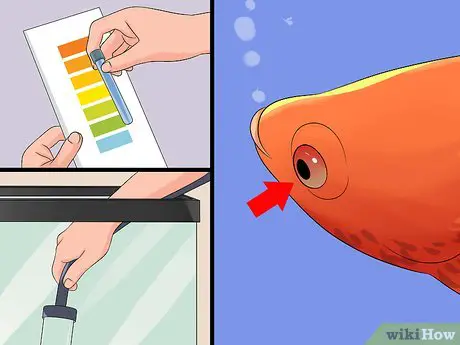Originally posted on May 17, 2023 @ 12:00 pm
Last Updated on 3 months by admin
Betta fish are one of the most popular choices for pet fish, thanks to their vibrant colors and easy-to-care-for nature. However, despite their hardiness, betta fish can still fall ill and even die if not properly cared for. In this guide, we’ll explore the common causes of betta fish deaths and provide tips on how to save your beloved pet from an untimely demise.
Whether you’re a seasoned betta fish owner or a newbie to the world of fishkeeping, this guide will provide you with the knowledge and tools you need to keep your betta fish healthy and thriving. From understanding the signs of illness to providing the right environment and diet, we’ll cover everything you need to know to save your betta fish from dying. So, let’s dive in and learn how to give your fish the best possible care!
If you notice your Betta fish is not swimming as much, has a loss of appetite, or seems lethargic, you may need to take action to save its life. Follow these steps to save your Betta fish from dying:
1. Check the water temperature and make sure it’s between 76-82°F.
2. Change at least 25% of the water in the tank.
3. Add aquarium salt to the water to help reduce stress and fight off infections.
4. Ensure the filter is working correctly and providing enough oxygen for the fish.
5. Provide a varied diet of high-quality Betta fish food and avoid overfeeding.
By taking these steps, you can help save your Betta fish from dying and ensure it lives a healthy and happy life.

How to Save Betta Fish From Dying?
Betta fish, also known as Siamese fighting fish, are popular pets due to their vibrant colors and unique personalities. However, they are also delicate creatures that require specific care and attention. Unfortunately, many betta fish owners face the heartbreaking experience of their fish dying. But with the right knowledge and actions, you can save your betta fish from dying. Here are some tips to help you out:
1. Identify the Problem
The first step to saving your betta fish is to identify the problem. There are several reasons why your betta fish may be sick or dying, including poor water quality, overfeeding, and diseases. You can identify the problem by observing your fish’s behavior and physical appearance. Look for signs of lethargy, loss of appetite, clamped fins, and discoloration.
If you suspect that the water quality is the problem, test the water using a water testing kit. If the water parameters are off, perform a partial water change and clean the tank. Overfeeding can also cause health problems in betta fish, so make sure you are feeding your fish the right amount of food.
2. Treat the Problem
Once you have identified the problem, it’s time to treat it. If the water quality is the issue, perform a partial water change and clean the tank. You can also add a water conditioner to neutralize harmful chemicals in the water. If your betta fish has a disease, consult a veterinarian or a fish expert to get the right treatment. Some common diseases in betta fish include fin rot, ich, and velvet.
3. Provide a Suitable Environment
Betta fish require a specific environment to thrive. They need a tank that is at least 5 gallons in size, with a filter, heater, and thermometer. The water temperature should be between 75-82°F, and the pH level should be between 6.5-7.5. Bettas also need a place to hide, such as plants or decorations.
Make sure you are providing a suitable environment for your betta fish. If the tank is too small or the water temperature is too low, your fish may become stressed and susceptible to diseases.
4. Feed a Balanced Diet
Betta fish need a balanced diet to stay healthy. They are carnivores and require a diet rich in protein. You can feed your betta fish pellets, flakes, or frozen foods such as bloodworms or brine shrimp. Make sure you are not overfeeding your fish, as this can cause health problems.
5. Keep the Tank Clean
A clean tank is essential for the health of your betta fish. You should perform a partial water change every week and clean the tank as needed. Remove any uneaten food or debris from the tank to prevent the buildup of harmful chemicals. You can also add live plants to the tank, as they can help absorb excess nutrients and keep the water clean.
6. Avoid Stressful Environments
Stress can also cause health problems in betta fish. Avoid keeping your fish in a stressful environment, such as a tank with aggressive tank mates or a tank with a strong current. Bettas are solitary fish and prefer to live alone.
7. Observe Your Fish
Observing your betta fish regularly can help you identify any health problems early on. Look for signs of lethargy, loss of appetite, clamped fins, and discoloration. If you notice any of these signs, take action immediately to save your fish.
8. Be Patient
Saving a sick or dying betta fish requires patience and persistence. It may take some time for your fish to recover, but with the right care and treatment, your fish can make a full recovery.
9. Benefits of Owning Betta Fish
Betta fish are not only beautiful pets but also have several benefits. They can help reduce stress and anxiety, improve mental health, and provide a sense of companionship. They are also easy to care for and can live up to 5 years with the right care.
10. Betta Fish vs Other Fish
Betta fish are unique pets and have several advantages over other types of fish. They are easy to care for and do not require a large tank or expensive equipment. They also have vibrant colors and unique personalities, making them a popular choice among pet owners. However, they are solitary fish and cannot be kept with other fish, unlike many other types of fish.
Frequently Asked Questions
Here are some common questions and answers on how to save betta fish from dying:
What are some signs that my betta fish is dying?
There are several signs that your betta fish may be dying. These include a loss of appetite, lethargy, clamped fins, and gasping for air at the surface of the water. Additionally, your betta fish may display unusual behavior such as swimming erratically or rubbing against objects in the tank. If you notice any of these symptoms, it’s important to take action quickly to save your betta fish.
How can I improve the water quality in my betta fish’s tank?
One of the most important things you can do to save your betta fish from dying is to maintain good water quality in their tank. This means performing regular water changes and monitoring the levels of ammonia, nitrite, and nitrate in the water. You can also add live plants to the tank to help absorb excess nutrients and provide oxygen for your fish. Finally, be sure to clean any decorations or substrate in the tank regularly to prevent the buildup of waste and debris.
What should I feed my betta fish to keep them healthy?
Betta fish are carnivorous and require a diet that is high in protein. You can feed your betta fish a variety of foods including pellets, flakes, and frozen or live foods such as brine shrimp or bloodworms. It’s important to avoid overfeeding your betta fish, as this can lead to obesity and other health problems. Be sure to also remove any uneaten food from the tank to prevent it from fouling the water.
How can I prevent diseases from affecting my betta fish?
One of the best ways to prevent diseases from affecting your betta fish is to maintain good water quality in their tank. You can also quarantine any new fish or plants before introducing them to the tank to prevent the spread of disease. Additionally, be sure to avoid overcrowding the tank and provide your betta fish with a healthy diet and regular exercise to strengthen their immune system.
What should I do if my betta fish is sick?
If you notice that your betta fish is sick, it’s important to take action quickly to save their life. First, identify the symptoms and research possible causes and treatments. You may need to isolate your betta fish in a separate tank to prevent the spread of disease. Additionally, be sure to maintain good water quality, provide a nutritious diet, and monitor your betta fish closely for any changes in behavior or health.

How To Save A Dying Betta | #Inactive #Betta
In conclusion, Betta fish are beautiful creatures that require proper care and attention to thrive. By following these tips, you can save your Betta fish from dying.
The first step is to ensure that the tank is properly set up with a filter, heater, and appropriate decorations. This will provide your Betta fish with a comfortable living environment and help them to stay healthy.
Secondly, it’s important to maintain a regular feeding schedule and offer a balanced diet. Overfeeding or feeding the wrong foods can lead to health problems and even death.
Lastly, keep an eye out for any signs of illness or distress in your Betta fish. If you notice anything out of the ordinary, take action immediately and consult with a veterinarian if necessary.
By following these simple steps, you can help your Betta fish live a long and healthy life. Remember to always provide them with the care and attention they deserve, and enjoy the beauty and companionship they bring to your life.
